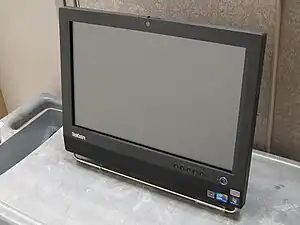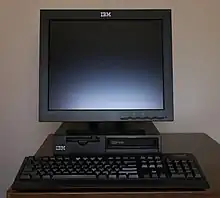.svg.png.webp) | |
 ThinkCentre All-in-One | |
| Developer | IBM (2003–2005) Lenovo (2005–present) |
|---|---|
| Manufacturer | IBM (2003-2005) Lenovo (2005-present) |
| Type | Desktop/All-in-one |
| Release date | May 2003 |
| Operating system | Microsoft Windows |
| CPU | Intel Core, AMD Ryzen |
| Display | Up to 24" 1440p screen (AiO models only) |
| Graphics | Nvidia GeForce, AMD Radeon, Intel Graphics |
| Camera | 1080p camera (AiO models only) |
| Power | Up to 750 W |
| Platform | Think |
| Online services | Microsoft 365, Adobe Creative Cloud, Adobe Acrobat |
| Marketing target | Business purpose |
| Predecessor | IBM NetVista |
| Website | Efficient and Reliable Lenovo ThinkCentre Desktops | Lenovo US |
The ThinkCentre is a line of business-oriented desktop computers designed, developed and marketed by Lenovo, and formerly by IBM from 2003 to 2005. ThinkCentre computers typically include mid-range to high-end processors, options for discrete graphics cards, and multi-monitor support.[1]
History
Launch
The ThinkCentre line of desktop computers was introduced by IBM in 2003. The first three models in this line were the S50, the M50, and A50p.[2] All three desktops were equipped with Intel Pentium 4 processors.[2] The chassis was made of steel and designed for easy component access without the use of tools.[2] The hard disk was fixed in place by a 'caddy' without the use of screws.[2] The caddy had rubber bumpers to reduce vibration and operational noise.[2]
Additional updates to the desktops included greater use of ThinkVantage technologies.[2] All desktop models were made available with ImageUltra.[2] The three desktop models also included an 'Access IBM' button, allowing access to onboard resources, diagnostic tools, automated software, and links to online updates and services.[2] Select models featured IBM's Embedded Security Subsystem, with an integrated security chip and IBM Client Security Software.[2]
Acquisition by Lenovo
In 2005, after completing its acquisition of IBM's personal computing business, leading to the IBM/Lenovo partnership, IBM/Lenovo announced the ThinkCentre E Series desktops, designed specifically for small businesses.[3] The ThinkCentre E50 was made available in tower and small form factor, with a silver and black design.[3]
In 2005, Technology Business Research (TBR) observed an increase in the customer satisfaction rate for ThinkCentre desktops.[4] According to TBR's "Corporate IT Buying Behavior and Customer Satisfaction Study” published in the second quarter of 2005, Lenovo was the only one of four surveyed companies that displayed a substantial increase in ratings.[4]
In May 2005, the ThinkCentre M52 and A52 desktops were announced by Lenovo.[5] These desktops marked the first time the ThinkCentre line incorporated dual-core processors and 64-bit technology.[5] At the time of release, Lenovo also announced plans to incorporate Intel Active Management Technology (iAMT) in future products.[5]
Product series

The ThinkCentre desktops available from IBM/Lenovo are:
- ThinkCentre A Series (SFF and AIO)
- ThinkCentre M Series (in tower, SFF, and USFF)
- ThinkCentre Edge (in tower and AIO form factors)
Notable Models
ThinkCentre X1
The ThinkCentre X1 is a mid-range all-in-one desktop computer announced by Lenovo at the 2016 International CES. The X1 is powered by a 6th generation Intel Core i7 processor paired with 16 gigabytes of 2,333 megahertz DDR4 RAM and a variety of storage media such as hard drives, hybrid drives, and solid state drives. The display uses 23.8-inch 1920 pixel by 1080 pixel panel with an anti-glare coating. A 1080p webcam is mounted just above the screen. Five USB 3.0 ports, DisplayPort video output, and an Ethernet port come standard. A memory card reader is optional.[6] One variant of the X1 is a display-only device.[7]
ThinkCentre Tiny-In-One II
The ThinkCentre Tiny-In-One II is Lenovo's second-generation all-in-one desktop computer. Its modular design allows its display and internals to be upgraded as needed. The ThinkCentre Tiny-In-One II comes in versions with 22-inch and 24-inch anti-glare displays with thin bezels and optional multitouch input. Both versions use 1920x1080 display panels. Two USB 3.0 ports, two USB 2.0 ports, one minI USB 2.0 port. and a Kensington security slot is included. Options for Microsoft Windows and Google's ChromeOS are both available.[8][9]
Chromebox Tiny
The Chromebox Tiny is a small desktop computer with 2-gigahertz Intel i3-5005U processor, 4 gigabytes of memory, a 16 GB solid-state drive, integrated graphics that runs Google's ChromeOS. It was designed for education and business. Its largest side measures about 7 inches square. It is 1.4 inches thick and weighs 2.2 pounds. Computers with this form factor are called "one-liter" machines in some countries that use the metric system. The Tiny can be mounted on the back of monitors or placed on walls with a VESA mount. The Chromebox Tiny has two USB 3.0 ports on its front and two more on its rear.[10] Dual-band 802.11ac Wi-Fi and Bluetooth 4.0 are both supported. An external antenna is included to improve reception. A mouse and keyboard come standard.[11]
M83 Tiny
The ThinkCentre M83 Tiny is a ultra small-form-factor desktop computer released in 2014. The M83 Tiny uses an Intel Core i5 processor. It comes standard with one DisplayPort jack, and Ethernet port, five USB 3.0 ports, and a VGA port. There is a customizable port that can be configured with another DisplayPort jack, a serial port, another USB port, or an HDMI port. Wi-fi is 802.11ac. Wireless accessories are supported via Bluetooth 4.0.[12]
S50

In 2004, an ultra-small version of the S50 was announced, the smallest desktop PC introduced until that time by IBM.[13] The ultra-small ThinkCentre S50 desktop weighed approximately the same as IBM's first notebook (IBM 5140 PC Convertible).[13] The ultra-small desktop was roughly the size of a New York City phonebook, or a box of cereal.[13] The ultra-small desktop also featured a tool-free tool-less steel chassis and IBM ThinkVantage Technologies.[13]
A series
A60
In August 2006, the ThinkCentre A60 desktop was announced.[14] It was the first ThinkCentre Desktop with AMD processors.[14]
In September 2006, Lenovo announced that its ThinkPad, ThinkCentre, and ThinkVision products received high ratings from EPEAT.[15] A total of 42 products were rated by EPEAT.[15] The ThinkCentre desktops received an overall rating of EPEAT silver.[15] This indicated that all criteria for environmentally safe computing had been met – including the minimum requirements and additional optional implementations.[15] Some of the criteria met included reduced levels of cadmium, mercury, and lead, energy efficiency, and reduced greenhouse gas emissions.[15]
In September 2006, Lenovo announced several desktops in the ThinkCentre line, including the M55p, M55, M55e, A55 and A53.[16]
A55
In January 2007, the ThinkCentre A55 small-form-factor desktop was announced by Lenovo.[17] The A55 was approximately 64% smaller than Lenovo's traditional tower desktops and 25% smaller than Lenovo's traditional small desktops.[17] In September 2007, Lenovo announced the ultra-small-form-factor A61e.[18]
Also in September 2007, two new M Series desktops were announced: the M57 and M57p.[19]
A58 and M58e
In March 2009, two small, low-cost desktops were announced by Lenovo: the ThinkCentre A58 and the ThinkCentre M58e.[20] The A58 desktop was designed for small and medium businesses, while the M58e was designed for medium-sized and large enterprises.[20] The desktops were made available in both tower and small form-factor versions.[20]
Environmental certifications
In March 2008, the ultra-small M57 and M57p desktops were announced.[21] This was because the M57 and M57p were the first desktops from any manufacturer to receive a GREENGUARD certification.[21] The desktops were also rated by EPEAT Gold and Energy Star 4.0, and were the first ThinkCentre desktops to feature post-consumer recycled content.[21] The noise levels of the desktops were also low – at 4.0bels or lower.[21]
In October 2008, the M58 and M58p desktops were announced.[22] One of the key features of the desktop was a ThinkVantage Technology called Power Manager, allowing users to remotely control the PC's electricity use.[22] The desktops were available in tower, SFF, and USFF.[22]
Timeline
| Timeline of the IBM Personal Computer |
|---|
 |
| Asterisk (*) denotes a model released in Japan only |
See also
- ThinkCentre: A Series, M Series and Edge Series
- ThinkPad
- ThinkStation
References
- ↑ "ThinkCentre Desktop Features". Retrieved 20 February 2012.
- 1 2 3 4 5 6 7 8 9 "IBM Unveils New ThinkCentre Line of Desktops Designed for Easy Maintenance and Lower Operating Costs". 21 May 2003. Retrieved 22 September 2011.
- 1 2 "Lenovo Launches First Desktop Line for Small Business". 18 October 2005. Retrieved 22 September 2011.
- 1 2 "Lenovo Posts Largest Percentage Gain in Desktop User Satisfaction". 30 August 2005. Retrieved 22 September 2011.
- 1 2 3 "Lenovo Powers up the Desktop with New Dual-Core ThinkCentre Models". 26 May 2005. Retrieved 22 September 2011.
- ↑ "The new Lenovo ThinkCentre X1: You won't believe how slim it is". Windows Central. 4 January 2016.
- ↑ Andrew E. Freedman (3 February 2016). "Lenovo Thinkpad Stack - Full Review and Benchmarks".
- ↑ Henry T. Casey (3 January 2016). "Lenovo's Modular ThinkCentre II Shrinks Bezel, Adds Speaker". Tom's Guide.
- ↑ Gabe Carey (3 January 2016). "These are Lenovo's First 2016 ThinkPads - CES 2016 - Page 4 - Digital Trends". Digital Trends.
- ↑ Riofrio, Melissa (27 April 2015). "Lenovo's $199 Chromebox Tiny is an affordable addition to its line of ThinkCentre Tiny PCs". PC World. United States. Retrieved 6 May 2015.
- ↑ Buzzi, Matthew (1 January 1970). "Lenovo ThinkCentre Chromebox Tiny Desktop Review & Rating". PCMag.com. Retrieved 4 September 2018.
- ↑ "Lenovo ThinkCentre M83 Tiny". PC Magazine. United States. Retrieved 10 March 2015.
- 1 2 3 4 "The Incredible Shrinking IBM Desktop". 9 June 2004. Retrieved 22 September 2011.
- 1 2 "Lenovo Introduces First ThinkCentre Desktop PCs with AMD Processors". 8 August 2006. Retrieved 22 September 2011.
- 1 2 3 4 5 "EPA-Funded Standard Gives Lenovo Green Thumbs-Up". 18 September 2006. Retrieved 22 September 2011.
- ↑ "Lenovo Debuts Fleet of Intel Core 2 Duo ThinkCentre Desktop PCs". 26 September 2006. Retrieved 22 September 2011.
- 1 2 "Lenovo Expands Desktop Lineup to Go Small on Size, Big on Value". 29 January 2007. Retrieved 22 September 2011.
- ↑ "Lenovo Raises Energy-Efficiency Bar with Its Smallest, Quietest Desktop PC". 12 September 2007. Retrieved 22 September 2011.
- ↑ "Lenovo Empowers Enterprise Manageability Platform with New ThinkCentre Desktop PCs". 18 September 2007. Retrieved 22 September 2011.
- 1 2 3 "Lenovo Retools ThinkCentre Business Desktops for Smaller, Lower Cost Options". 10 March 2009. Retrieved 22 September 2011.
- 1 2 3 4 "Lenovo Plants Seeds For "Greener" Computing With New ThinkCentre PC". 5 March 2008. Retrieved 22 September 2011.
- 1 2 3 "Lenovo turns the lights down low with power manager on new ThinkCentre PC". 29 October 2008. Retrieved 5 June 2022.
